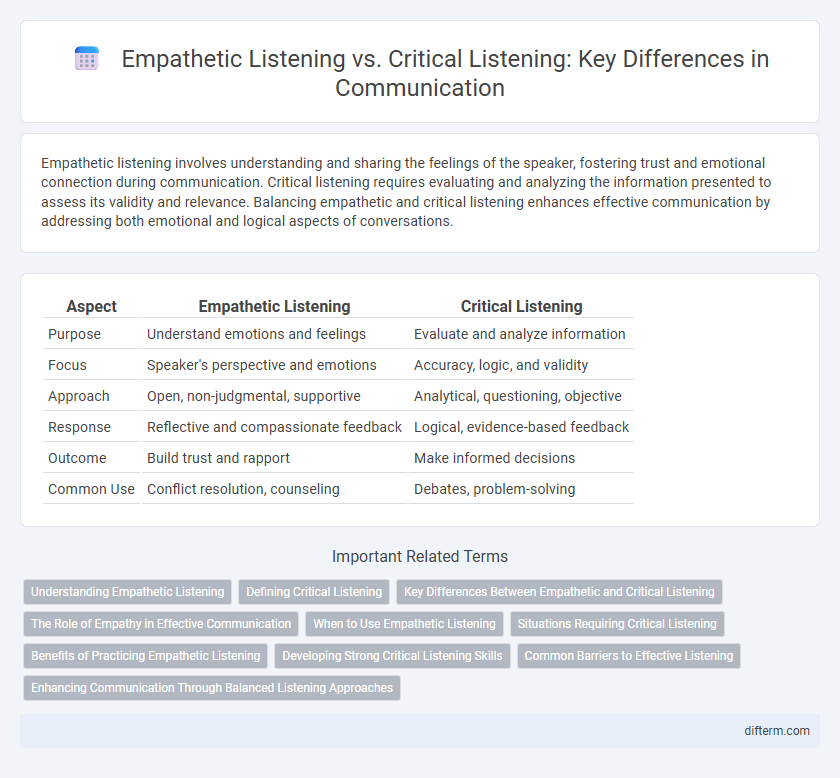Empathetic listening involves understanding and sharing the feelings of the speaker, fostering trust and emotional connection during communication. Critical listening requires evaluating and analyzing the information presented to assess its validity and relevance. Balancing empathetic and critical listening enhances effective communication by addressing both emotional and logical aspects of conversations.
Table of Comparison
| Aspect | Empathetic Listening | Critical Listening |
|---|---|---|
| Purpose | Understand emotions and feelings | Evaluate and analyze information |
| Focus | Speaker's perspective and emotions | Accuracy, logic, and validity |
| Approach | Open, non-judgmental, supportive | Analytical, questioning, objective |
| Response | Reflective and compassionate feedback | Logical, evidence-based feedback |
| Outcome | Build trust and rapport | Make informed decisions |
| Common Use | Conflict resolution, counseling | Debates, problem-solving |
Understanding Empathetic Listening
Empathetic listening involves fully engaging with the speaker's emotions and perspectives to foster genuine understanding and connection. This listening style prioritizes emotional awareness and nonjudgmental support, allowing the listener to accurately interpret feelings behind the message. Unlike critical listening, which focuses on evaluating and analyzing content, empathetic listening builds trust and strengthens interpersonal relationships by validating the speaker's experience.
Defining Critical Listening
Critical listening involves actively analyzing and evaluating the information presented to assess its validity, credibility, and relevance. It requires distinguishing between facts and opinions, identifying logical fallacies, and recognizing biases within the message. This type of listening is essential for making informed decisions and developing well-reasoned responses during communication.
Key Differences Between Empathetic and Critical Listening
Empathetic listening involves understanding and sharing the speaker's emotions, prioritizing emotional connection and support, while critical listening focuses on evaluating information for accuracy, logic, and relevance. Key differences include the purpose of listening--empathetic listening aims to build rapport and trust, whereas critical listening seeks to analyze and judge content critically. Empathetic listeners respond with compassion and validation, whereas critical listeners challenge ideas and assess arguments to form reasoned conclusions.
The Role of Empathy in Effective Communication
Empathetic listening enhances effective communication by fostering understanding and emotional connection, enabling listeners to fully grasp speakers' feelings and perspectives. In contrast, critical listening centers on evaluating and analyzing information for judgment and decision-making, often prioritizing logic over emotional context. Integrating empathy in communication improves relational trust and reduces misunderstandings, making it essential for constructive and meaningful exchanges.
When to Use Empathetic Listening
Empathetic listening is essential in situations involving emotional support, conflict resolution, or building trust, as it enables understanding the speaker's feelings and perspectives deeply. It is most effective during personal conversations, counseling sessions, or when addressing sensitive topics where validating emotions fosters connection. Employing empathetic listening promotes openness, reduces defensiveness, and enhances meaningful communication.
Situations Requiring Critical Listening
Situations requiring critical listening often involve decision-making processes, evaluating arguments, or analyzing information for accuracy and relevance. This form of listening demands careful attention to detail, logical reasoning, and the ability to identify biases or inconsistencies in the speaker's message. Professionals, such as judges, editors, and managers, rely heavily on critical listening to ensure informed, objective conclusions in complex or high-stakes environments.
Benefits of Practicing Empathetic Listening
Practicing empathetic listening enhances interpersonal relationships by fostering trust and emotional connection, which promotes open and honest communication. This approach improves conflict resolution by allowing listeners to fully understand speakers' feelings and perspectives, leading to more compassionate and effective responses. Empathetic listening also reduces misunderstandings and creates a supportive environment that encourages collaboration and mutual respect.
Developing Strong Critical Listening Skills
Developing strong critical listening skills involves actively analyzing and evaluating the information presented to identify biases, assumptions, and logical inconsistencies. This skill enhances decision-making and problem-solving by enabling listeners to discern credible sources and separate facts from opinions. Effective critical listening supports clearer communication and fosters informed responses in both professional and personal interactions.
Common Barriers to Effective Listening
Barriers to effective listening include distractions, preconceived notions, and emotional biases that hinder both empathetic and critical listening. Empathetic listening is often obstructed by a listener's tendency to judge or interrupt, reducing genuine understanding. Critical listening faces challenges from selective hearing and resistance to new ideas, which impair objective analysis.
Enhancing Communication Through Balanced Listening Approaches
Empathetic listening deepens interpersonal connections by prioritizing understanding emotions and perspectives, while critical listening enhances decision-making through objective analysis and evaluation of information. Balancing these approaches fosters more effective communication, enabling individuals to respond thoughtfully and constructively. Integrating empathy with critical assessment cultivates trust and clarity, essential for successful dialogue in both personal and professional contexts.
Empathetic Listening vs Critical Listening Infographic

 difterm.com
difterm.com